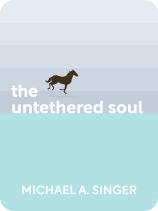

This article is an excerpt from the Shortform book guide to "The Untethered Soul" by Michael A. Singer. Shortform has the world's best summaries and analyses of books you should be reading.
Like this article? Sign up for a free trial here .
In what areas of your life do you feel especially sensitive and liable to feel pain? How have you inadvertently arranged your life around the desire to avoid it? And most importantly, what can you do to let go of this pain?
Many people feel fragmented and deeply unhappy because they’ve built their whole lives on pain avoidance. From childhood, they’ve unconsciously built their thoughts, actions, and beliefs around avoiding their inner pain. Spiritual growth requires you to let go of pain, but for that, you must first embrace it, and only then, work on weeding out its source.
In this article, you will learn how to let go of your inner pain. But first, you need to understand how pain is built up in the psyche.
Let Go of Pain: Weeding Out Your Inner Thorn
To understand inner pain and its effects, imagine that you have a thorn embedded in your arm, right on a nerve. It’s a serious, impairing problem. Should you handle the pain by removing the thorn, or by making sure nothing touches it?
If you decide to protect the thorn, this work will consume your life. Any behavior pattern for avoiding pain will actually become a doorway for that pain to enter, because when you attempt to avoid your deep pain, you build layers of sensitivity around it.
In real life, you have just such a thorn. It’s made up of your Samskaras, those blocked energies in your heart from stored-up past impressions. This is why your days are precarious as you navigate through potential pain points at every turn: You’ve chosen to protect your thorn, so you’ve made your life a minefield of pain.
For example, if your pain is about feelings of rejection, you may build a busy social schedule. You may dress, act, and talk in ways that your mind thinks will earn your friends’ approval. And with these instinctive actions, you’ve now sensitized all of these areas with your original pain, so that any one of them can now make you suffer. Other real-life examples might include sensitivities about loneliness, your physical appearance, your level of ability, or your intelligence. You have the same two choices with all: either build your life around protecting yourself from the pain, or remove its source.
If you choose a life of protecting your thorn, you’ll build a thorn-shaped life as your daily actions revolve around shielding the painful spot. Your thoughts and relationships will be about it. Your whole life will become a reflection of it. Instead of solving the problem, you’ll make it the center of your universe. For example, if you suffer from loneliness, but instead of removing that thorn, you build your life around protecting yourself from the pain, you might keep people at a distance. You might marry someone who makes you feel the least lonely, but then you’ll spend your whole marriage trying to please your spouse in order to avoid abandonment. And/or you’ll create a permanent state of emotional distance to preemptively protect yourself while making manipulative attempts to ensure the other person’s devotion. Your life will be shaped around your thorn.
You Can Remove Your Thorn
To free yourself from a life of pain, employ the following principles which can take on a variety of practical forms:
1) Use the events and encounters of your daily life as opportunities for liberation, Even watching a television show where the story arouses the pain of an inner thorn represents a chance for you to release the pain. Learn to watch the sensitive part of you. Notice when it’s feeling a disturbance, such as jealousy, lack, or fear. Use these opportunities as they arise to embrace your pain.
2) Release the initial pain early to avoid being trapped in the long term. The longer you wait, the harder it will be to let it go. Remember, if you let your spiritual heart close around something, you’ll be psychologically sensitive about that thing going forward.
3) Learn that it’s okay to feel inner disturbances because they don’t disturb the seat of your consciousness. This is true freedom, the kind that comes not from solving your problems on the level where they present themselves, but from transcending them. Rest in the fact that you aren’t the pain of your thorn, nor are you the thorn itself. Instead, you’re the one who sees these things. And since inner thorns are just blocked energy from the past, you can release them. You don’t have to fear them. They’re just more things to be observed in the universe. View pain as energy passing through your heart before the gaze of consciousness. Instead of contracting and closing and damming up the energy, relax and let it go. Sometimes you can feel a palpable heat inside you as you release pain. It’s called “The fire of yoga,” and it’s the feeling of pain being purified. Learn to enjoy it.
4) Finally, get some perspective. Go outside on a clear night and look up. Cultivate a proper sense of the massive scale of the universe and your relative insignificance within it. Do you really need—do you really want—to spend your life avoiding pain by choosing certain clothes?
The Bliss Beyond Pain
In addition to deep pain, you have beauty, peace, freedom, and ecstasy inside you. They’re on the other side of the pain. You have to go through the pain to find your true greatness. When you find there’s a vast ocean of love beyond the fear and pain, you’ll encounter breathtakingly beautiful experiences. You’ll forge a personal relationship with this inner force of beauty, and it will replace your current relationship with inner pain. Peace and love will now run your life.
Inner Pain and Addiction
You’re “addicted” to your psyche because you mistakenly think your psyche protects you from pain. But in fact, your psyche is pain. You need to realize that your psyche is very ill, as evidenced by its extreme sensitivity. When your physical body is healthy, you tend not to notice it. You only notice it when there’s a problem. The fact that you frequently notice your psyche because of mental-emotional pain—anger, embarrassment, anxiety—shows you just how unwell it is.
Your psyche’s illness comes from fear and resistance. In learning about nonresistance and unconditional happiness, you learned that your mind is unwell because you’ve given it the impossible job of creating a secure world by resisting life, by trying to make everyone and everything do what you want. You’ve set your psyche the task of conforming the whole world to your sensitivities.
You Can Break the Addiction
The good news is that you can break this addiction to your psyche. You do this in the same straightforward way that you’d quit any bad habit: You just stop. Like refusing to put another cigarette in your mouth, you stop telling your mind that its job is to fix everything.
Breaking the addiction requires you to wake up and realize that the trouble is in you, not the world. You can’t solve your inner problems by getting better at external games. External changes won’t address the root of your inner problem. If you feel financially insecure and personally lonely, you’ll still feel that way even if your finances improve and you find the “perfect” spouse, because you’ll simply bring your inner problems into that new situation and infect it with negativity. Getting what you think you want doesn’t satisfy you. It just sets the stage for the next round of pain.
Here are some specific practices for giving up your addiction:
- Notice when your mind is trying to “make everything okay.” Gently let go of this. Don’t fight your mind. That only reinforces its neurotic activity.
- Let your thinking mind quiet down by watching it from your seat of consciousness. Let thoughts just happen, even neurotic ones. When you refuse to identify with thoughts, they start to quiet down. Practice this inner observation with little things to begin with. Calmly observe your annoyance when somebody says something you don’t like. Notice the feeling, and refuse to attribute its source to the other person. Gradually expand this practice to encompass bigger things.
- Set up specific awareness practices throughout the day. For example, use the daily ritual of getting into your car as a moment to stop and center. After you sit behind the wheel, pause a moment to remind yourself that you’re the witness and that you don’t have to buy into your inner roommate’s drama. Hook awareness practices to opening doors, answering your phone, and other regular activities.
Free and Clear
Once you’re free from your psyche’s demands, you can wake up and face each day like a vacation. You can enjoy your work and relationships effortlessly. You can fall asleep each night and let everything go. Eventually, your practice of disciplined awareness will lead to a persistently centered consciousness. Like a healthy body, your psyche will just operate naturally, without pain.

———End of Preview———
Like what you just read? Read the rest of the world's best book summary and analysis of Michael A. Singer's "The Untethered Soul" at Shortform .
Here's what you'll find in our full The Untethered Soul summary :
- How to find your true self instead of your false identities
- Why getting lost in the moment is important
- Why death is the greatest spiritual teacher about life







I am really happy with your blog because your article is very unique and powerful for new readers.
Health issues are often a source of fear and stigma, and many leaders avoid them entirely.
Good information for health and you provide full information about health.
Thanks for support! your website interface is very cool and simply to understand.
Health issues are often a source of fear and stigma, and many leaders avoid them entirely.
Good information for health and you provide full information about health.